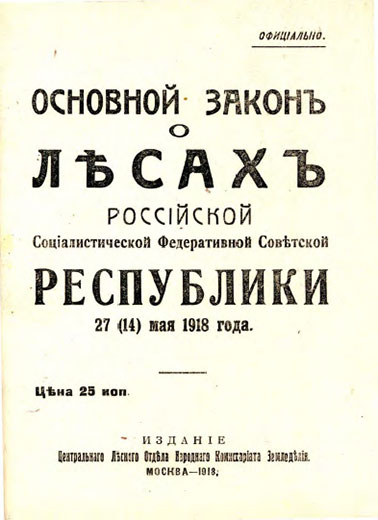
We kindly inform you that, as long as the subject affiliation of our 300.000+ articles is in progress, you might get unsufficient or no results on your third level or second level search. In this case, please broaden your search criteria.

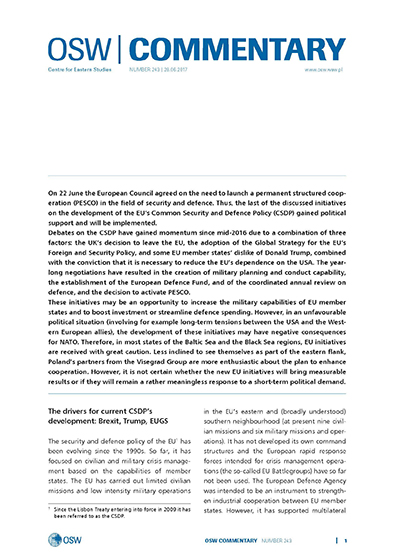
Despite the fact that more than 60 years have passed since the death of Joseph Stalin, the leader of the USSR from 1922 to 1953, the memory of him remains alive. For several years running Stalin has topped the ranking of the most remarkable figures in Russia’s history. Portraits of him appear at political demonstrations and religious events; new monuments to the dictator are erected. The Kremlin’s official rhetoric increasingly refers to the positive aspects of the Soviet era, in particular to the victory in World War II. Representatives of the state’s administration and the Orthodox Church have been making favourable comments about Stalin.
More...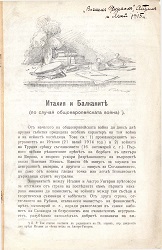
A print of the Military Journal, September 15, 1915, referring to Italy's policy on the Balkans.
More...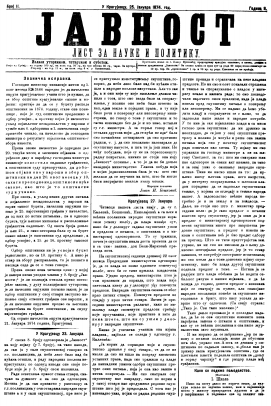
Званична исправка; У Крагујевцу 23. Јануара; Крагујевац 27. Јануара; Како се подиже пољоделство; 1. Школе; 2. Угледна добра; ОДБОРСКИ ИЗВЕШТАЈ ПОДНЕТ РАДНОЈ СКУПШТИНИ; ДОПИСИ; Шабац 14. Јануара; Бела река срез Зајечарски окр. црноречки; ИЗВЕШТАЈ ФИНАНСИЈСКОГ ОДБОРА НАРОДНОЈ СКУПШТИНИ; Крагујевачка новост; Јавна коресподенција; Нек се зна; ОГЛАСИ; Удеоничарима крагујевачке друштвене штампарије; Наредба;
More...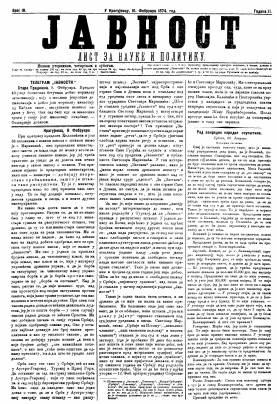
ТЕЛЕГРАМ ''ЈАВНОСТИ''; Крагујевац 8. Фебруара; Рад ванредне народне скупштине; Штудкје о стању пољске привреде у Србији; Спољна политика немачка; ПИТАЊЕ; РАЗЛИЧНОСТИ; СТЕЧАЈ; ОГЛАСИ; Удеоничарима крагујевачке друштвене штампарије;
More...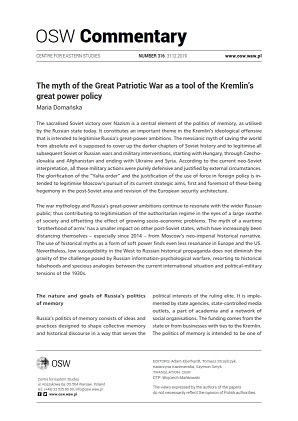
The sacralised Soviet victory over Nazism is a central element of the politics of memory, as utilised by the Russian state today. It constitutes an important theme in the Kremlin’s ideological offensive that is intended to legitimise Russia’s great-power ambitions. The messianic myth of saving the world from absolute evil is supposed to cover up the darker chapters of Soviet history and to legitimise all subsequent Soviet or Russian wars and military interventions, starting with Hungary, through Czechoslovakia and Afghanistan and ending with Ukraine and Syria. According to the current neo-Soviet interpretation, all these military actions were purely defensive and justified by external circumstances. The glorification of the “Yalta order” and the justification of the use of force in foreign policy is intended to legitimise Moscow’s pursuit of its current strategic aims, first and foremost of these being hegemony in the post-Soviet area and revision of the European security architecture. The war mythology and Russia’s great-power ambitions continue to resonate with the wider Russian public; thus contributing to legitimisation of the authoritarian regime in the eyes of a large swathe of society and offsetting the effect of growing socio-economic problems. The myth of a wartime ‘brotherhood of arms’ has a smaller impact on other post-Soviet states, which have increasingly been distancing themselves – especially since 2014 – from Moscow’s neo-imperial historical narrative. The use of historical myths as a form of soft power finds even less resonance in Europe and the US. Nevertheless, low susceptibility in the West to Russian historical propaganda does not diminish the gravity of the challenge posed by Russian information-psychological warfare, resorting to historical falsehoods and specious analogies between the current international situation and political-military tensions of the 1930s.
More...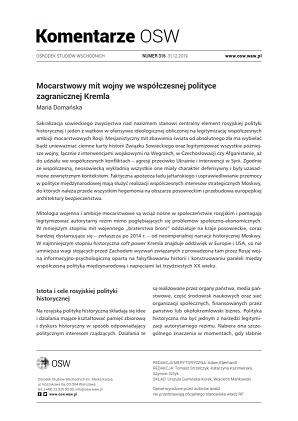
Sakralizacja sowieckiego zwycięstwa nad nazizmem stanowi centralny element rosyjskiej polityki historycznej i jeden z wątków w ofensywie ideologicznej obliczonej na legitymizację współczesnych ambicji mocarstwowych Rosji. Mesjanistyczny mit zbawienia świata od absolutnego zła ma wybielać bądź unieważniać ciemne karty historii Związku Sowieckiego oraz legitymizować wszystkie późniejsze wojny, łącznie z interwencjami wojskowymi na Węgrzech, w Czechosłowacji czy Afganistanie, aż do udziału we współczesnych konfliktach – agresji przeciwko Ukrainie i interwencji w Syrii. Zgodnie ze współczesną, neosowiecką wykładnią wszystkie one miały charakter defensywny i były uzasadnione zewnętrznym kontekstem. Faktyczna apoteoza ładu jałtańskiego i usprawiedliwianie przemocy w polityce międzynarodowej mają służyć realizacji współczesnych interesów strategicznych Moskwy, do których należą przede wszystkim hegemonia na obszarze posowieckim i przebudowa europejskiej architektury bezpieczeństwa. Mitologia wojenna i ambicje mocarstwowe są wciąż nośne w społeczeństwie rosyjskim i pomagają legitymizować autorytarny reżim mimo pogłębiających się problemów społeczno-ekonomicznych. W mniejszym stopniu mit wojennego „braterstwa broni” oddziałuje na kraje posowieckie, coraz bardziej dystansujące się – zwłaszcza po 2014 r. – od neoimperialnej narracji historycznej Moskwy. W najmniejszym stopniu historyczna soft power Kremla znajduje oddźwięk w Europie i USA, co nie umniejsza wagi stojących przed Zachodem wyzwań związanych z prowadzoną tam przez Rosję wojną informacyjno-psychologiczną opartą na falsyfikowaniu historii i konstruowaniu paraleli między współczesną polityką międzynarodową i napięciami lat trzydziestych XX wieku.
More...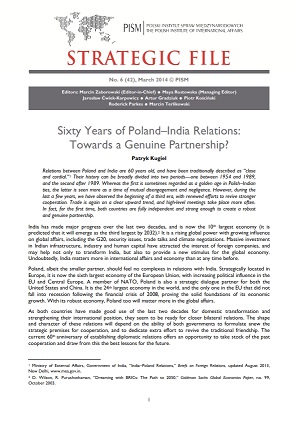
Relations between Poland and India are 60 years old, and have been traditionally described as “close and cordial.” Their history can be broadly divided into two periods—one between 1954 and 1989, and the second after 1989. Whereas the first is sometimes regarded as a golden age in Polish–Indian ties, the latter is seen more as a time of mutual disengagement and negligence. However, during the last a few years, we have observed the beginning of a third era, with renewed efforts to revive stronger cooperation. Trade is again on a clear upward trend, and high-level meetings take place more often. In fact, for the first time, both countries are fully independent and strong enough to create a robust and genuine partnership.
More...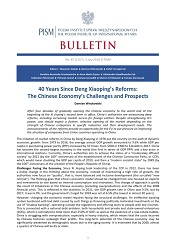
After four decades of gradually opening the Chinese economy to the world and at the beginning of the Xi Jinping’s second term in office, China’s authorities are announcing deep reforms, including increasing market access for foreign entities. Despite strengthening Xi’s power, one should expect a further, selective opening of the market depending on the strength of Chinese enterprises in specific industries and their development needs. The announcements of the reforms provide an opportunity for the EU to put pressure on improving the situation of companies from Union countries operating in China.
More...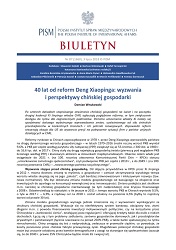
Po czterech dekadach stopniowego otwierania chińskiej gospodarki na świat i na początku drugiej kadencji Xi Jinpinga władze ChRL ogłaszają pogłębione reformy, w tym zwiększanie dostępu do rynku dla zagranicznych podmiotów. Pomimo umocnienia władzy Xi należy się spodziewać dalszego wybiórczego wprowadzania zmian, uzależnionego od siły chińskich przedsiębiorstw w konkretnych branżach i ich potrzeb rozwojowych. Zapowiedzi reform stwarzają okazję dla UE do wywarcia presji na polepszenie sytuacji firm z państw unijnych działających w ChRL.
More...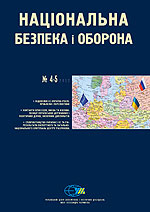
EU-UKRAINE-RUSSIA RELATIONS: PROBLEMS AND PROSPECTS // CHAPTER 1. EU-UKRAINE-RUSSIA: POLITICAL DIMENSION OF RELATIONS // STATE OF EXECUTION OF THE ACTION PLAN ON VISA LIBERALISATION(APVL) PROVIDED BY THE EUROPEAN UNION TO UKRAINE // CHAPTER 2. ECONOMIC RELATIONS IN THE EU-UKRAINE-RUSSIATRIANGLE // CHAPTER 3. EU-UKRAINE-RUSSIA ENERGY “TRIANGLE”:DEPENDENCY, INTERESTS, CONTRADICTIONS // CHAPTER 4. SECURITY DIMENSION OF EU-UKRAINE-RUSSIARELATIONS // CHAPTER 5. HUMANITARIAN DIMENSION OF EU-UKRAINE-RUSSIARELATIONS // CHAPTER 6. CONCLUSIONS AND PROPOSALS // EU-UKRAINE-RUSSIA: PROBLEMS, ACHIEVEMENTS, PROSPECTS (Interviews, Ukrainian government officials and politicians) // EU-UKRAINE-RUSSIA RELATIONS: INTERVIEWS WITH FOREIGN DIPLOMATS (Interviews, foreign diplomats) // GEOPOLITICS // UKRAINE, RUSSIA, EUROPE // UKRAINE’S FOREIGN POLICY: LOSING ITS BALANCE // UKRAINE BETWEEN RUSSIA AND THE EUECONOMY // RUSSIA’S ECONOMIC INTERACTION WITH UKRAINE AND THE EU STATESFOR THE SAKE OF MODERNISATION: A CORPORATE PERSPECTIVE // RISKS OF INVOLVING UKRAINE IN THE SPHERE OF RUSSIA’S ECONOMIC INTERESTS // SOCIO-CULTURAL DIMENSION // THE DICHOTOMY OF RUSSKIY MIR FOR UKRAINE // THE STATE AND PROSPECTS OF EU-UKRAINE-RUSSIA RELATIONS:EXPERTS’ ASSESSMENTS // RELATIONS OF UKRAINE WITH THE EU AND RUSSIA:CITIZENS’ ASSESSMENTS
More...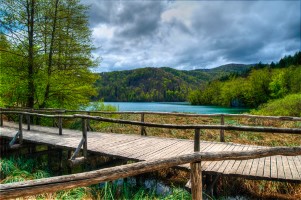
U ovoj, 2021. godini, navršavaju se dva jubileja od značaja za srpsko-hrvatske odnose. Prvi je stogodišnjica od usvajanja i proglašenja Vidovdanskog ustava 1921. godine (koji je imao širi značaj, ne samo u kontekstu srpsko-hrvatskih odnosa, ali je obuhvatao i njih), a drugi je trideseta godišnjica od početka ratnih sukoba u Hrvatskoj 1991. godine (pri čemu ni taj sukob nije ostao samo srpsko-hrvatski). Dva jubileja, oba ispunjena mnogim nepomirljivo suprotstavljenim stanovištima, od toga kakva je Jugoslavija trebalo da bude do toga da uopšte nije ni trebalo da je bude. Između dve okrugle godišnjice nalazi se čitava jedna istorija u kojoj su postojali kvalitativno najrazličitiji vidovi međusobne interakcije: od savršene irelevantnosti srpske odnosno hrvatske etničke identifikacije za međusobne odnose do njenog podizanja na pijedestal najvažnijeg sadržaja.
More...
Đorđe Balašević se morao dobro potruditi da kod mene izbriše mrlju one pesme u kojoj obećava sistemu da treba da računa na njih. Uradio je to relativno brzo i dobio ne samo moj oproštaj, nego obožavanje, jer me je tada i uvek docnije izražavao: to su bile pesme Svirajte mi Jesen stiže, dunjo moja i Panonski mornar. I to obožavanje su gotovo uvek pratile suze. Sa mamom, prečanskom Sredozemkom sam padala u ravničarski sevdah, više zbog nje. Posle sam i sama razvila morsku čežnju, i sa njom ljubav prema panonskoj Sloveniji. Samo po sebi je to znak da nisam Slovenka, jer podjednako volim (sa cmizdranjem) malo slovenačko more i ravnice oko i preko Drave. A pod stare dane sam se nekako pomirila i sa Alpima, ali to nije ono pravo: ne izaziva suze.
More...
Nemam želju da se uključujem u raspravu o tome je li Beograd varoš ili velegrad. Ima zaista smisla sagledati ulogu tog grada u svemu što se događalo poslednjih četrdesetak godina. Ja nisam istoričar, ali je to grad u kojem sam živeo kada je izabrao da igra glavnu ulogu u tragediji. Operativna reč je izabrao. Cela priča, kako je ja vidim, složenija je i istovremeno ružnija. Najpre o složenosti.
More...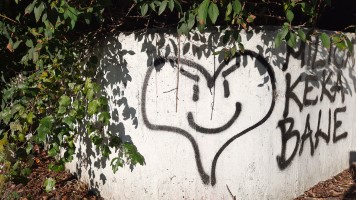
Balkanske paralele sa Trumpovom Amerikom. Tko bi rekao da će se najmoćnija i najbogatija zemlja na svijetu pokazati toliko ranjivom da se uspoređuje s nesretnom Jugoslavijom. Trumpovoj Americi svijet se ruga ali i brine da se ne raspadne naglo, tragično poput SFRJ ili uz još veću lomljavu u međunarodnom poretku, onom poput Sovjetskog saveza prije 30 godina. Ako SAD tako skonča bilo bi puno veće štete jer o njemu ovise mnoge zemlje, kao i međunarodne organizacije i međunarodni poredak. I u liberalnu demokraciju kao idealni društveno politički sistem, kojeg je Amerika nudila svijetu kao dio mita o kraju povijesti iz 1989, sve se više sumnja. Pa i Amerikanci tako, kojih je nedavno čak 73 milijuna, ako su znali što čine, glasovalo protiv tog sustava a za diktaturu, autoritarni režim, karizmatski a ne stručni i demokratski autoritet. Najzanimljivije je da tu do jučer svemoćnu Ameriku nisu toliko uzdrmale ni ekonomske recesije koje su došle i prošle u međuvremenu, ni uspon Kine i opravak Rusije kao rivala u borbi za globalno vodstvo. Ni teroristički napadi od 11. rujna 2001, ni apsurdni i skupi ratovi kojima su američke desničarske vlade na to odgovarale.
More...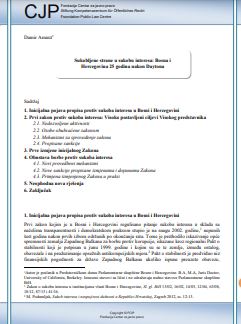
Bosnia and Herzegovina was among the first countries in the Western Balkans region to have a law on the conflict of interest. This was not, however, due to an effort of domestic political forces, but the Law was instead imposed in 2002 by the High Representative, an international overseer with wide powers under the Dayton Peace Accords. The Law contained definitions and enforcement mechanisms modelled after the best practices in democratic societies, and included a wide array of public officials and their immediate relatives. The proscribed sanctions, however, were unduly severe, requiring in most cases that offending officials be barred from public office for a period of four years. The Law, nonetheless was successful in curbing conflict of interest in the country, and was significantly improved with several subsequent amendments. In 2013, however, the Law was substantially weakened, with enforcement powers transferred from the independent Central Election Commission to a Committee largely composed of elected officials. These changes resulted in a conflict of interest process completely controlled by political parties, subject to frequent and lasting blockades, and completely dormant in periods between elections. Indeed, the new body delivered only ten sanctions in the six years of its existence. This has created a need – voiced by Western governments, various NGO's, and several likeminded elected officials – for a completely new law on the conflict of interest. Such a Draft Law was introduced in the Bosnia and Herzegovina Parliamentary Assembly toward the end of 2017. Due to various procedural delay and blockade mechanisms invoked by the ruling parties, the Draft Law is yet to be considered by the BiH Parliament. Until this or a similar law is adopted, creating a truly independent enforcement body, Bosnia and Herzegovina is unlikely to make meaningful strides on the road to the European Union membership.
More...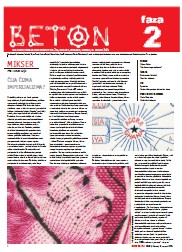
MIKSER, Dušan Grlja: Čija čizma imperijalizma?; ŠTRAFTA, Aleksandra Sekulić: Dani bez datuma; ZID, Apoteka: Svaka slika postaje datum bez dana; VREME SMRTI I RAZONODE, Porša Olajviola: Električni tobogan
More...
The wars of the 1990s in the former Yugoslavia have had severe and longterm consequences, which Montenegro too still faces today and only to a limited degree. Also, almost all states of the former Yugoslavia face the challenge of addressing systemic violations of human rights, which is reflected in the process of building functional democratic institutions that should establish a responsible attitude towards the recent violent past. Such a relationship is inconceivable without establishing the truth about the fate of persons who are still listed as missing due to the armed conflicts of the 1990s. The states of the region continue to owe the families of 9,969 missing persons a full and impartial investigation into the circumstances under which their loved ones were killed or went missing, and they fail to carry out responsible sentences in accordance with the gravity of the crime committed. In Montenegro, the legislative framework does not recognize the families of persons considered missing as civilian victims of war, whereas the system of reparations is flawed and discriminatory. Given the recorded activities of Montenegro in the armed conflicts during the 1990s, as well as the court-established facts indicating the role of Montenegrin citizens in these events, a proactive approach by Montenegrin institutions is crucial in determining the fate of missing persons. Victims’ communities have high expectations from these institutions, which is proportional to the participation of the armed forces under the direct or indirect control of the state of Montenegro in the waged wars. Unfortunately, the disproportionate commitment of Montenegrin decision-makers and institutions to this issue remains. The process of searching for the missing is difficult and conditioned by the political situation in the countries of the region. Although the need to find out the truth about the fate of persons who disappeared during the armed conflicts is expressed, above all, among their family members, and sporadically appears on the agenda of meetings of statesmen in the region, in practice, there are obstacles to the search for missing persons. These obstacles range from the inadequate capacities of state bodies involved in the search for missing persons, through insufficient financial resources, to a lack of political will to substantially improve regional cooperation, which also includes the determination to make the search for missing persons more efficient. In general, there is not enough information on this issue in Montenegro, and it is also marginalized in public discourse. Therefore, this publication, as an alternative report, offers an overview of international standards and national legislation, reviewing the results and challenges of the search for missing persons during the armed conflicts in the former Yugoslavia in the 1990s, but also proposes recommendations for improving efficiency in this area.
More...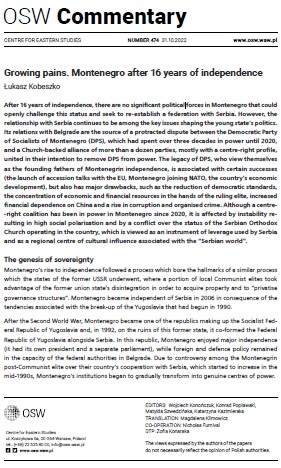
After 16 years of independence, there are no significant political forces in Montenegro that could openly challenge this status and seek to re-establish a federation with Serbia. However, the relationship with Serbia continues to be among the key issues shaping the young state’s politics. Its relations with Belgrade are the source of a protracted dispute between the Democratic Party of Socialists of Montenegro (DPS), which had spent over three decades in power until 2020,and a Church-backed alliance of more than a dozen parties, mostly with a centre-right profile, united in their intention to remove DPS from power. The legacy of DPS, who view themselves as the founding fathers of Montenegrin independence, is associated with certain successes (the launch of accession talks with the EU, Montenegro joining NATO, the country’s economic development), but also has major drawbacks, such as the reduction of democratic standards, the concentration of economic and financial resources in the hands of the ruling elite, increased financial dependence on China and a rise in corruption and organised crime. Although a centre-right coalition has been in power in Montenegro since 2020, it is affected by instability resulting in high social polarization and by a conflict over the status of the Serbian Orthodox Church operating in the country, which is viewed as an instrument of leverage used by Serbia and as a regional centre of cultural influence associated with the “Serbian world”.
More...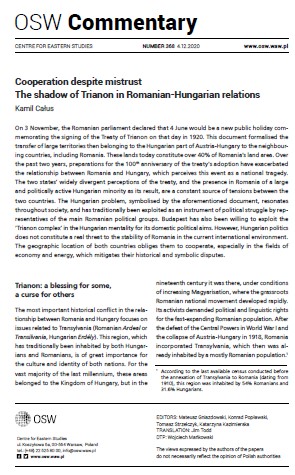
On 3 November, the Romanian parliament declared that 4 June would be a new public holiday commemorating the signing of the Treaty of Trianon on that day in 1920. This document formalised the transfer of large territories then belonging to the Hungarian part of Austria-Hungary to the neighbouring countries, including Romania. These lands today constitute over 40% of Romania’s land area. Over the past two years, preparations for the 100th anniversary of the treaty’s adoption have exacerbated the relationship between Romania and Hungary, which perceives this event as a national tragedy. The two states’ widely divergent perceptions of the treaty, and the presence in Romania of a large and politically active Hungarian minority as its result, are a constant source of tensions between the two countries. The Hungarian problem, symbolised by the aforementioned document, resonates throughout society, and has traditionally been exploited as an instrument of political struggle by representatives of the main Romanian political groups. Budapest has also been willing to exploit the ‘Trianon complex’ in the Hungarian mentality for its domestic political aims. However, Hungarian politics does not constitute a real threat to the stability of Romania in the current international environment. The geographic location of both countries obliges them to cooperate, especially in the fields of economy and energy, which mitigates their historical and symbolic disputes.
More...